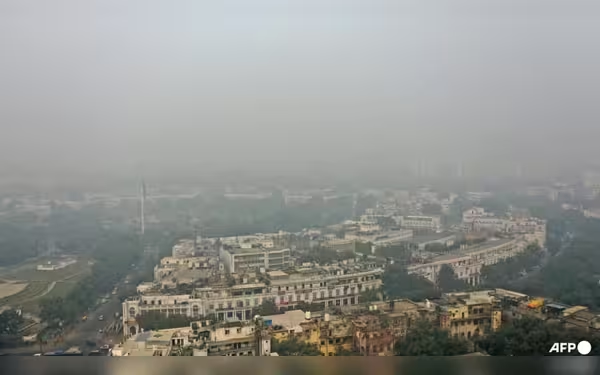Monday, December 23, 2024 10:36 AM
New Delhi Schools Shift to Online Classes Amid Severe Smog Crisis
- New Delhi schools transition to online classes due to hazardous air quality.
- PM2.5 levels exceed WHO recommendations, posing health risks.
- Supreme Court emphasizes clean air as a fundamental human right.
 Image Credits: channelnewsasia
Image Credits: channelnewsasiaNew Delhi schools move to online classes as smog levels soar, raising health concerns and prompting Supreme Court intervention.
NEW DELHI: The air quality in India's capital, New Delhi, has reached alarming levels, prompting the government to switch schools to online classes starting Monday until further notice. This drastic measure comes as toxic smog levels surged past 60 times the daily maximum recommended by the World Health Organization (WHO). The situation has become dire, with the smog being linked to thousands of premature deaths each year, particularly affecting the health of children and the elderly.
According to pollution monitors from IQAir, levels of PM2.5 pollutants, which are dangerous microparticles that can cause cancer and enter the bloodstream through the lungs, peaked at a staggering 921 micrograms per cubic meter on Monday. To put this into perspective, the WHO considers a reading above 15 micrograms in a 24-hour period to be unhealthy. Some individual monitoring stations reported even higher levels, with one government-run monitor recording PM2.5 pollutants at 1117 micrograms, which is 74 times the WHO maximum.
Residents are feeling the impact of this pollution crisis. Subodh Kumar, a 30-year-old rickshaw puller, expressed his frustration, saying, "My eyes have been burning for the last few days. Pollution or no pollution, I have to be on the road; where else will I go?" His words reflect the harsh reality faced by many who rely on outdoor work for their livelihood. The smog has not only affected New Delhi but has also extended across northern India, with tourists at the Taj Mahal in Agra struggling to capture clear photographs of the iconic monument, which is nearly invisible due to the thick haze.
The dense, grey smog that envelops New Delhi each year is primarily attributed to stubble burning by farmers in neighboring regions, as well as emissions from factories and traffic fumes. A recent report by The New York Times highlighted that dangerous fumes are also being released from a power plant that incinerates the city's landfill garbage. In response to the worsening air quality, primary schools were ordered to cease in-person classes, and additional restrictions were imposed, including limiting diesel-powered trucks and construction activities.
Authorities are hopeful that by keeping children at home, traffic congestion will decrease, leading to improved air quality. The government has urged vulnerable groups, including children, the elderly, and those with pre-existing lung or heart conditions, to stay indoors as much as possible. However, many families cannot afford air filters, and most do not have homes that can be effectively sealed from the toxic air. Rinku Kumar, a 45-year-old rickshaw taxi driver, voiced the concerns of many, stating, "The rich ministers and officials can afford to stay indoors, not ordinary people like us. Who can even afford an air purifier when paying monthly bills is a challenge?"
In a landmark ruling last month, India's Supreme Court declared that clean air is a fundamental human right, ordering both the central and state governments to take action. The court is set to meet again on Monday to discuss the lack of progress in addressing this health crisis. As the situation continues to unfold, it is clear that immediate and effective measures are needed to combat the pollution that plagues not only New Delhi but also other regions in India and neighboring countries like Pakistan.
The smog crisis in New Delhi serves as a stark reminder of the urgent need for comprehensive environmental policies and community awareness. As citizens grapple with the health implications of poor air quality, it is essential for governments to prioritize clean air initiatives and for individuals to advocate for their right to a healthier environment. Only through collective action can we hope to breathe easier in the future.













